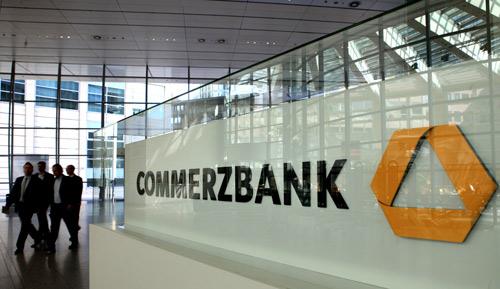
A branch of Commerzbank in Frankfurt, Germany. In 2010, the lender worked on six M&A transactions between Chinese and German companies. Hannelore Foerster/Bloomberg
SHANGHAI - Commerzbank AG, Germany's second-biggest bank by assets, said its investment banking business in China will focus mainly on advising and financing Chinese companies' accelerating merger-and-acquisition (M&A) activities in Germany.
Philipp Mohr, Commerzbank's global head for M&A advisories, told China Daily on Wednesday that M&A service is one of the core strengths of the bank's investment banking business in China and that it hopes to increase its involvement in the country's growing investments in Germany.
"Over the past 10 years, we've seen almost every year a certain increase in deal-related activities from Chinese companies (in Germany)," said Mohr.
"The growth of the Chinese economy provides ample reason for Chinese companies to look abroad to strengthen their expertise; in particular, to look for a lot of the technological expertise in Germany."
The automotive and engineering industries, where Germany has technological advantages, are areas that Chinese companies are looking at, Mohr said.
According to Germany Trade and Invest, a government business promotion group, the number of Chinese investments in the country shot up to 45 in 2009, from seven in 2007.
Mohr said that in arranging deals for Chinese companies, the bank's strong corporate client base in Germany gives it a competitive edge over its competitors, including Deutsche Bank AG, Germany's biggest bank by assets.
Commerzbank now has 120,000 corporate clients, the most of all German banks.
"We have direct access to the senior management, and shareholders (of companies in Germany). This enables us to facilitate Chinese companies' M&A activities in Germany," said Andries Hendriksen, Commerzbank's head of corporate finance for Asia-Pacific.
In 2010, Commerzbank worked on six M&A transactions between Chinese and German companies. And this year it has been secured by Chinese companies to work on three more, according to Mohr.
It also has advised on VEM Vermgensverwaltung GmbH's 3.6 billion euro ($5.17 billion) sale of German-based generic drugs producer Ratiopharm Group to Teva Pharmaceutical Industries of Israel, one of the biggest cross-border M&A deals in Germany in 2010.
Hendriksen said the bank has no immediate plan to be locally incorporated or set up a joint securities venture in the country, as have many other foreign banks, including Morgan Stanley and UBS AG.
"We still have plenty of growth potential without having to be locally incorporated or setting up a joint venture," he said.
On the corporate banking side, Commerzbank, which has the biggest market share in Germany's export settlement, wants to play a bigger role in trade settlement between China and Germany, including those denominated in yuan, Hendriksen said.
Germany is China's biggest trading partner in Europe, with bilateral trade reaching 130 billion euros in 2010.
Last month, the bank launched yuan accounts for corporate customers in Germany. The new service is in addition to the yuan account services that the bank already provides through its branches in Shanghai, Beijing and Hong Kong.
According to a survey published last month by HSBC Holdings PLC, eight in 10 businesses on the Chinese mainland that have not yet started to use the yuan to settle cross-border trade are planning to use or adopt it conditionally in future transactions.





